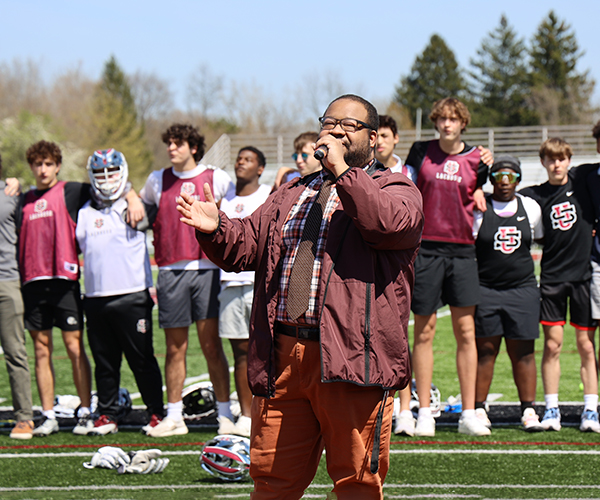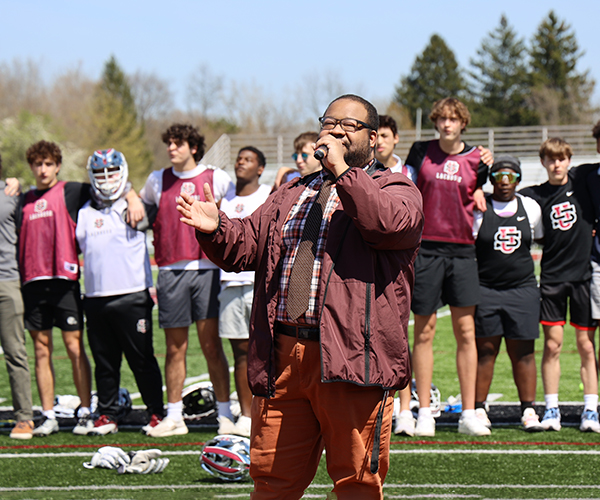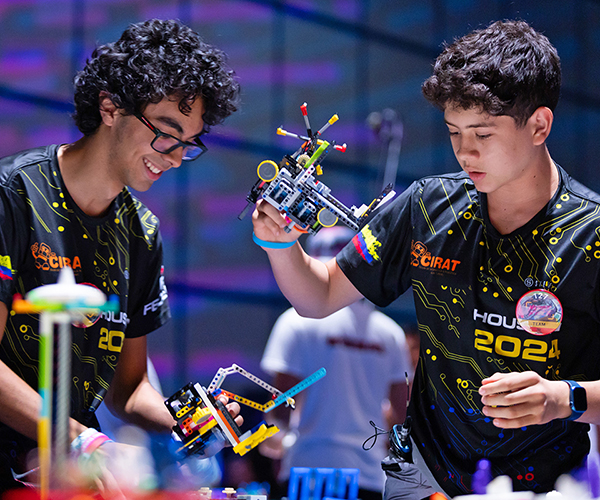Carol Paull likes to tell the story of a day care provider who took her group of 3-year-olds on the same walk every day.
“Doesn’t it get boring?” parents would ask.
“No,” she’d tell them. “It’s incredible the differences that the children notice.”
Paull, director of field placement and professional development in the education and allied studies department at John Carroll University, says engaging children in natural learning can be just that simple. And it might just be the best approach for making sure your child is ready to start school.
“The most important thing is talk to your kids, spend time with your kids, read to your kids,” says Paull. “You want them to be curious, you want them to be lifelong learners. If you start skilling and drilling them at 2, 3, or 4 years old, they’re going to hate school before they even start it, let alone when they get to second or third grade.”
In fact, that pressure parents feel to prepare their children for school has spawned a new term: “comparanoia,” or the paranoia created by comparing your child to someone else’s.
Experts, like Paull, advise parents to relax. While pediatricians can help a parent assess developmental norms, most children learn at their own pace. And, even if a child is more advanced than yours, keep the perspective that it all usually evens out by third grade.
“Some kids pick up on things quicker than others. Some kids learn how to read in preschool and others don’t learn until first grade,” says Carolyn Landis, a pediatric psychologist at Rainbow Babies and Children’s Hospital. “If they’re making progress and showing interest and interacting with peers and interacting with parents, I don’t think people should be concerned.”
In fact, Geoffrey Putt, the director of parenting and family support services at Akron Children’s Hospital, often uses his own children as an example when speaking to parents about child development. His daughter spoke early but took longer to develop physically, whereas his son climbed on everything but spoke later than his daughter.
But neither developmental timeline will indicate how they’ll do when they enter school, because both are well within the norm.
Most school districts are willing to meet children “where they are,” says Paull, a former first-grade teacher and preschool director.
Still, parents can use natural techniques to get a child school-ready.
“It’s more than about cognitive or academic skills. It’s about social and emotional functioning,” says Putt. “It’s about physical development: how you hold a pencil, tying your shoes, lining up. You have to make sure that you’re introducing all of those areas.”
“No,” she’d tell them. “It’s incredible the differences that the children notice.”
Paull, director of field placement and professional development in the education and allied studies department at John Carroll University, says engaging children in natural learning can be just that simple. And it might just be the best approach for making sure your child is ready to start school.
“The most important thing is talk to your kids, spend time with your kids, read to your kids,” says Paull. “You want them to be curious, you want them to be lifelong learners. If you start skilling and drilling them at 2, 3, or 4 years old, they’re going to hate school before they even start it, let alone when they get to second or third grade.”
In fact, that pressure parents feel to prepare their children for school has spawned a new term: “comparanoia,” or the paranoia created by comparing your child to someone else’s.
Experts, like Paull, advise parents to relax. While pediatricians can help a parent assess developmental norms, most children learn at their own pace. And, even if a child is more advanced than yours, keep the perspective that it all usually evens out by third grade.
“Some kids pick up on things quicker than others. Some kids learn how to read in preschool and others don’t learn until first grade,” says Carolyn Landis, a pediatric psychologist at Rainbow Babies and Children’s Hospital. “If they’re making progress and showing interest and interacting with peers and interacting with parents, I don’t think people should be concerned.”
In fact, Geoffrey Putt, the director of parenting and family support services at Akron Children’s Hospital, often uses his own children as an example when speaking to parents about child development. His daughter spoke early but took longer to develop physically, whereas his son climbed on everything but spoke later than his daughter.
But neither developmental timeline will indicate how they’ll do when they enter school, because both are well within the norm.
Most school districts are willing to meet children “where they are,” says Paull, a former first-grade teacher and preschool director.
Still, parents can use natural techniques to get a child school-ready.
“It’s more than about cognitive or academic skills. It’s about social and emotional functioning,” says Putt. “It’s about physical development: how you hold a pencil, tying your shoes, lining up. You have to make sure that you’re introducing all of those areas.”
[Don’t follow a script.] Address issues in the normal course of a day, says Putt. “Sharing, cooperation, manners, teamwork. These are all skills that can be used every day when picking up toys, playing on the playground, going to the park, going out to a restaurant,” he says.
[Fuel your child’s interests.] Remember the old “pick your battles” philosophy of parenting? In learning, experts say, there should be no battles at all.
Instead, listen to your child and ask questions about his interests. “What color is that?” and “How many do you see?” are questions that allow a child to learn, while building curiosity.
Instead, listen to your child and ask questions about his interests. “What color is that?” and “How many do you see?” are questions that allow a child to learn, while building curiosity.
[Emphasize the three C’s.] Curiosity, cooperation and coordination are skills that children need even more than reading or math before entering kindergarten (and beyond).
“Global thinkers are people who are creative, who are thoughtful, who are critical thinkers, who are problem-solvers,” Paull emphasizes. “That starts from birth.”
But that doesn’t mean you should throw away the alphabet letters on the refrigerator or stop doing the train-number puzzle your toddler wants to do over and over again.
“Global thinkers are people who are creative, who are thoughtful, who are critical thinkers, who are problem-solvers,” Paull emphasizes. “That starts from birth.”
But that doesn’t mean you should throw away the alphabet letters on the refrigerator or stop doing the train-number puzzle your toddler wants to do over and over again.
[Play together.] It is important that children are aware of letters and numbers, but it’s more critical for you to make it fun. Get down on the ground with your child to assemble a puzzle. Have your child identify letters on a T-shirt or count the pairs of socks you’re putting in the laundry basket, Putt says. Use magnetic letters on the refrigerator to help your child start learning her name. (But buy upper- and lowercase letters so she learns their proper use, Putt adds.)
School readiness can be learned through everyday family activities, not just expensive toys or games.
School readiness can be learned through everyday family activities, not just expensive toys or games.
[Read together.] It’s important to go beyond the story on the page and ask the child questions to help develop critical-thinking skills.
“Realize that this process is going to unfold naturally and don’t push it at too young of an age, because that’s going to hurt your parent-child relationship,” advises Rainbow’s Landis. “You don’t want to get into power struggles about learning when they’re in preschool.”
“Realize that this process is going to unfold naturally and don’t push it at too young of an age, because that’s going to hurt your parent-child relationship,” advises Rainbow’s Landis. “You don’t want to get into power struggles about learning when they’re in preschool.”
[Go outside.] It’s probably not a good idea to ever just stick your child in front of a video or computer, no matter how educational the product manufacturer says it is. That is, unless your child thinks it’s fun and you’re doing it with her — for a short period of time.
Landis cautions that the American Academy of Pediatrics recommends that children under the age of 2 should never be put in front of a TV or computer, while children over the age of 2 should be limited to less than two hours daily.
Landis cautions that the American Academy of Pediatrics recommends that children under the age of 2 should never be put in front of a TV or computer, while children over the age of 2 should be limited to less than two hours daily.
[Take a class.] Signing up your child for preschool programs, art classes or swimming lessons can develop helpful skills such as separating from a parent for a short period of time and learning from a different adult. Both are necessary when going off to kindergarten, says Akron Children’s Hospital’s Putt.
There’s also such a thing as “positive peer pressure,” he says.
“Your child may have no motivation to tie their shoes, but if they know that everyone in the class is learning how to tie their shoes, that might be motivation for them,” Putt says. “In kindergarten, tying shoes is one of the things you start learning at the beginning.”
But if your daughter isn’t the first one to turn those shoelace bunny ears into a knot, that’s OK too. “The more stimulating things you do, the better,” says Putt. “But just because they learn things earlier doesn’t mean they’re going to be more intelligent.”
There’s also such a thing as “positive peer pressure,” he says.
“Your child may have no motivation to tie their shoes, but if they know that everyone in the class is learning how to tie their shoes, that might be motivation for them,” Putt says. “In kindergarten, tying shoes is one of the things you start learning at the beginning.”
But if your daughter isn’t the first one to turn those shoelace bunny ears into a knot, that’s OK too. “The more stimulating things you do, the better,” says Putt. “But just because they learn things earlier doesn’t mean they’re going to be more intelligent.”



